Constitutional Carry is the basic principle that if you are legally eligible to purchase a firearm, you should be able to carry that weapon, open or concealed, for self-defense without government “permission.”
Constitutional Carry laws recognize the right of every law-abiding citizen to carry a firearm, openly or concealed, on their person, without having to receive government permission in the form of a mandatory state-issued permit.
These laws affirm the nature of our individual God-given right to be armed, as codified in the Second Amendment of the U.S. Constitution which states:
“A well-regulated Militia, being necessary to the security of a free State, the right of the people to keep and bear Arms, shall not be infringed.”
Constitutional Carry may also be referred to as Freedom to Carry, Permit-less Carry or Vermont Carry.
Constitutional Carry is not “Unrestricted Carry.” It also does not abolish existing permit systems, or their corresponding reciprocity agreements.
Passing a Constitutional Carry bill is a key goal of the National Association for Gun Rights’ State Legislative program. As of June, 2023, 27 states have adopted some form Constitutional Carry, making it is one of hottest pro-gun fights of the last decade.
For more information, make a selection from the Constitutional Carry topic icons to learn more. For questions that are not addressed in these pages, please contact us.
DISCLAIMER: SUMMARIES DO NOT REFLECT ENTIRETY OF STATUTE, PLEASE CONSULT STATUTE IN EACH STATE BEFORE CARRYING. THE NATIONAL ASSOCIATION FOR GUN RIGHTS IS NOT LIABLE FOR UNLAWFUL CARRY UNDER ANY CIRCUMSTANCES.
Alabama
- Alabama’s Constitutional Carry law allows anyone not otherwise prohibited from possessing a firearm aged 19 and up to carry, open or concealed, without a government permit.
- There is no residency requirement.
- Gov. Kay Ivey signed HB 272, “Constitutional Carry” on March 10, 2022. The law took effect on January 1, 2023.

Alaska
- Alaska’s Constitutional Carry law allows anyone not otherwise prohibited from possessing a firearm aged 21 and up to carry, open or concealed, without a government permit.
- There is no residency requirement.
- Does not apply to law-abiding adults aged 18-20.
- On June 11, 2023, Governor Frank Murkowski signed Constitutional Carry into law.
Arizona
- Arizona’s Constitutional Carry law allows anyone not otherwise prohibited from possessing a firearm aged 21 and up to carry, open or concealed, without a government permit.
- Does not apply to law-abiding adults aged 18-20.
- Gov. Jan Brewer signed SB 1108 “Constitutional Carry” into law on April 16, 2010. The law took effect July 29, 2010.
Arkansas
- Arkansas’s Constitutional Carry law allows anyone not otherwise prohibited from possessing a firearm aged 18 and up to carry, open or concealed, without a government permit.
Florida
- Florida’s Constitutional Carry law allows anyone not otherwise prohibited by law aged 21 and up to carry concealed without a government permit.
- Does not apply to law-abiding adults aged 18-20
- Open carry is not legal in Florida, except for a few limited exceptions such as when engaged in fishing, camping, lawful hunting or target practice at an indoor range.
- Gov. Ron DeSantis (R) signed HB 543 into law on April 3, 2023, making Florida the 26th constitutional carry state in the U.S. The law took effect July 1, 2023.

Georgia
- Georgia’s Constitutional Carry law allows anyone 21 years of age or older to carry concealed without a government permit.
- Does not apply to law-abiding adults aged 18-20 unless in the military.
- Open carry is legal in Georgia only with a Georgia Weapons Carry License (WCL) or a concealed carry permit from a state Georgia honors. Some areas are off-limits, including schools and courthouses.
- There is no residency requirement
- Georgia recognizes weapons permits from all other states.
- Gov. Brian Kemp signed SB 319 into law on April 12, 2022, permitting constitutional carry in Georgia.
Idaho
- Idaho’s Constitutional Carry law allows anyone not otherwise prohibited from possessing a firearm aged 18 and up to carry, open or concealed, without a government permit.
- There is no residency requirement.
- Some areas are off-limits, including elementary schools and courthouses.
- Gov. Buch Otter signed SB 1389, “Constitutional Carry” on March 25, 2016. The law allowing for both residents and non-residents took effect on July 1, 2020.
Indiana
- Indiana’s Constitutional Carry law allows anyone 18 years of age or older not otherwise prohibited from carrying or possessing a handgun to do so without a government permit.
- There is no residency requirement
- Municipalities may prohibit or restrict possession of firearms in county hospitals, any building owned by the locality if all entrances have metal detectors and at least one law enforcement officer inspecting people and bags, and enforce restrictions imposed by event organizers on property leased by local governments.
- A person without a license can only carry a handgun in a vehicle that is owned, leased, rented, or otherwise controlled by the person or another person if the handgun is unloaded, not readily accessible, and secured in a case.
- Gov. Eric Holcomb signed HB 1296, “Constitutional Carry” into law on March 20, 2022. The law took effect July 1, 2022.

Iowa
- Iowa’s Constitutional Carry law allows anyone 21 years of age or older not otherwise prohibited from possessing a handgun to carry a handgun openly or concealed without government permission.
- Law-abiding adults 18-20 are still required to have a permit.
- Iowa law enforcement has access to concealed carry permit registry.
- Open carry of handguns around the State Capitol and Capitol grounds is prohibited except by law enforcement.
- The minimum age for non-professional permits is 21 years old and 18 years old for professional permits.
- Concealed carry permits require a state-approved firearms training course.
- Iowa honors reciprocity for permits from all States and U.S. Jurisdictions.
- Gov. Kim Reynolds signed HF 756, “Constitutional Carry” into law on April 2, 2021. The law took effect July 1, 2021.
Kansas
- Kansas’s Constitutional Carry law allows anyone 18 years of age or older and not otherwise prohibited from possessing a handgun to carry openly and anyone 21 years of age or older and not otherwise prohibited from possessing a handgun to carry concealed without a government permit.
- Law-abiding adults aged 18-20 are required to obtain provisional concealed carry licenses.
- Carrying a handgun in a vehicle without a license is prohibited for adults aged 18-20 unless the handgun is unloaded and secured.
- Concealed handguns in state and municipal buildings that have adequate security measures is prohibited
- Public employees are prohibited from carrying concealed on premises of employers business or while engaged in official duties.
- Kansas honors reciprocity with all States and U.S. Jurisdictions.
- Gov. Sam Brownback signed SB 15, “Constitutional Carry” into law on April 2, 2015. The law took effect July 1, 2015.

Kentucky
- Kentucky’s Constitutional Carry law allows anyone not otherwise prohibited from possessing a firearm aged 21 and up to carry, open or concealed, without a government permit.
- Does not apply to law-abiding adults aged 18-20.
- There is no residency requirement.
- Persons under age 21 may be eligible to possess a firearm, but are not allowed to carry the firearm concealed in Kentucky.

Lousiana
- Louisiana’s Constitutional Carry law allows anyone not otherwise prohibited from possessing a firearm aged 18 and up to carry, open or concealed, without a government permit.
- When approached by an officer of the law, a carrier must inform the officer they are carrying a firearm.
- Gov. Jeff Landry signed SB 1 “Constitutional Carry” on March 5th, 2024.
- Constitutional Carry takes effect July 4th, 2024
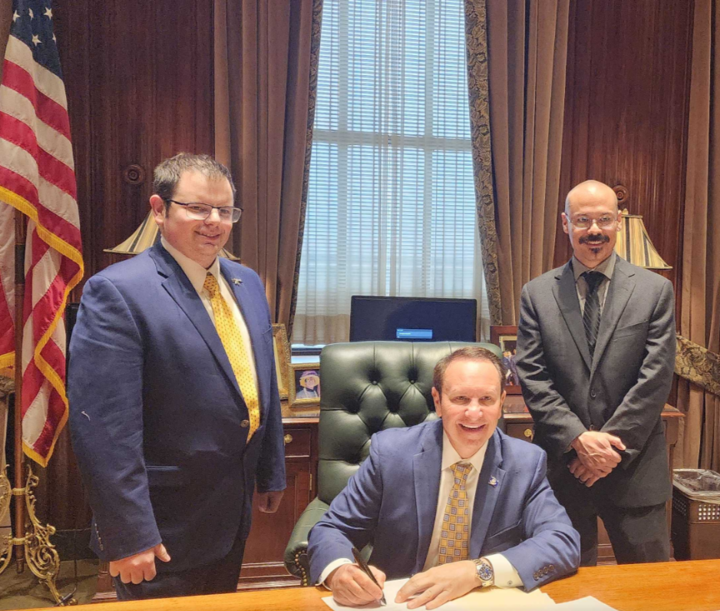
Nebraska
- Nebraska’s Constitutional Carry law any person 21 years of age or older who can legally possess a firearm under State and Federal Law can carry a concealed handgun without a permit.
- Effective Date: September 2, 2023
- Does not apply to law-abiding adults aged 18-20.
- Only residents of the state may Constitutionally Carry, but the state will accept permits from other states.
- Nebraska is a “preemption” state, localities can restrict the carrying of firearms.
New Hampshire
- New Hampshire’s Constitutional Carry law allows anyone not otherwise prohibited from possessing a firearm aged 18 and up to carry, open or concealed, without a government permit.
- Effective Date: February 22, 2017
- There is no residency requirement.
- Gov. Chris Sununu signed SB 12, “Constitutional Carry” on February 22, 2017 and it went into immediate effect.
- Prohibited to carry in: court rooms, but other places such as parks, polling places and hospitals might have administrative regulations or prohibitions.

North Dakota
- North Dakota’s Constitutional Carry law applies to everyone who is 18 or older who can legally possess a firearm under North Dakota and Federal Law.
- Effective Date: August 1, 2023
- The law only applies to residents of North Dakota.
- No permitless open carry.
- The law prohibits carrying a loaded firearm in a motor vehicle.
- Prohibited to carry in: schools, federal property, or business with posted signage.
Maine
- Maine’s Constitutional Carry law applies to any person 21 or older, or at least 18 and active duty or honorably discharged military, who can legally possess a firearm, is allowed to carry openly or concealed.
- There is no residency requirement
- Effective Date: October 12, 2015
- Prohibited from carrying in: schools and court rooms.
Mississippi
- Mississippi’s Constitutional Carry law applies to anyone at least 18 years of age who can legally possess a firearm with several restrictions, including that the firearm be carried in a holster, sheath or scabbard.
- Effective Date: July 1, 2015
- There is no residency requirement.
- Standard Firearms Permit (SFP) and an enhanced version (E-SFP) allows carry in more locations.
- Prohibited from carrying in: court rooms, polling places, police stations, schools and bars.
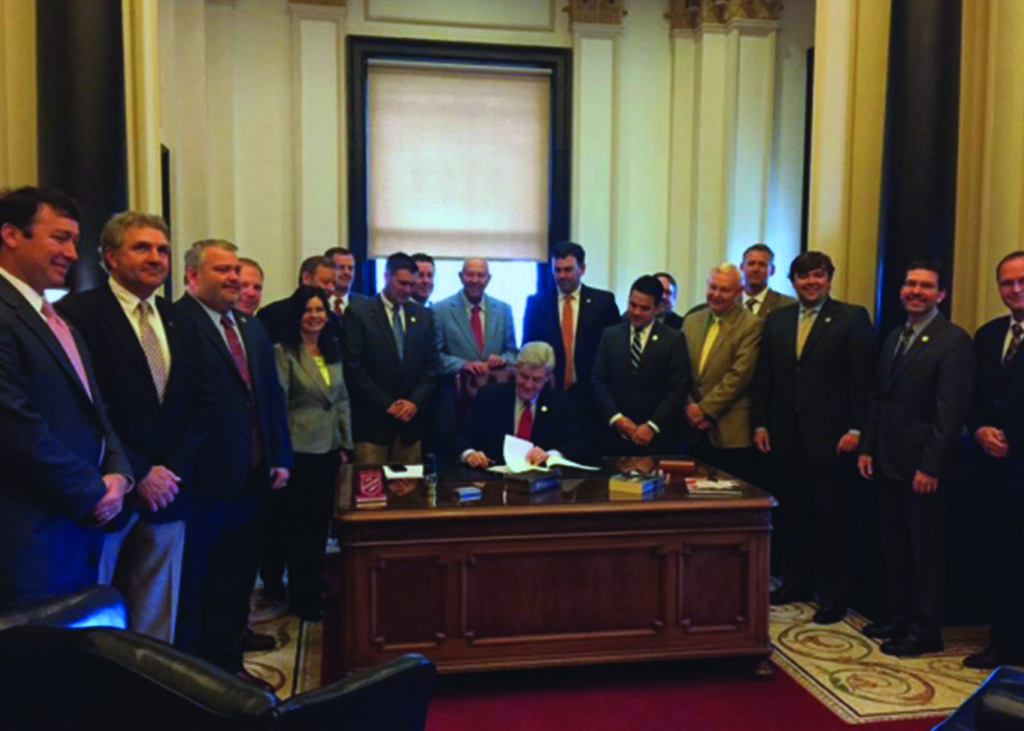
Missouri
- Missouri’s Constitutional Carry law allows anyone not otherwise prohibited from possessing a firearm aged 19 (18 for members of the military) years and up to carry, open or concealed, without a government permit.
- There is no residency requirement.
- Local authorities can restrict your access to concealed carry of a firearm in any building owned, leased, or controlled by the county or municipality.
- Local authorities may require a CCP for open carry.
- It is illegal to openly carry a firearm into a church, school bus, school, or onto the grounds of a school function.
- On June 27, 2016, Governor Jay Nixon vetoed Constitutional Carry. On September 16, 2016, the Missouri House and Senate reconvened for the veto-override session, successfully overriding the Governor’s veto of the bill. On January 1, 2017, Constitutional Carry went into effect.
Montana
- Montana’s Constitutional Carry law allows anyone not otherwise prohibited from possessing a firearm aged 18 and up to carry, open or concealed, without a government permit.
- There is no residency requirement.
- A permit is required to carry concealed in portions of a building used for state or local government offices and related areas in the building that have been restricted.
- Local municipalities can prohibit Constitutional Carry in publicly owned and occupied buildings.
- Gov. Greg Gianforte signed HB 102, “Constitutional Carry” on February 18, 2021. The law took effect on June 1, 2021.

Ohio
- Ohio’s Constitutional Carry law allows anyone not otherwise prohibited from possessing a firearm aged 21 and up to carry, open or concealed, a handgun without a government permit.
- There is no residency requirement.
- Anyone not otherwise prohibited from possessing a firearm aged 18 and up is able to open carry a handgun.
- While carrying in vehicles is not addressed in the Constitutional Carry bill, the Ohio Attorney General claims that it is legal to possess a loaded firearm in a vehicle.
- Residents and non-residents under 21 require a valid concealed handgun license issued by another U.S. jurisdiction to conceal carry.
- It is not permitted to concealed carry a firearm:
- On private property with a posted sign in clear view or providing verbal notice.
- Most government buildings.
- Churches or other religious buildings.
- School property.
- Various other “no-carry” zones.
- On March 14, 2022, Gov. Mike DeWine signed Senate Bill 215 “Constitutional Carry”. The law took effect on June 12, 2022.

Oklahoma
- Oklahoma’s Constitutional Carry law allows anyone not otherwise prohibited from possessing a firearm aged 21 and up (or at least 18 years old for members or veterans of the U.S. military) to carry, open or concealed, without a government permit.
- Carrying handguns with a caliber greater than .45 is not permitted.
- It is not permitted to concealed carry a firearm:
- In an establishment whose primary purpose is the serving of alcoholic beverages or to consume alcoholic beverages while carrying.
- Into schools or government buildings.
- Into a sports venue during a professional sporting event or in any place where gambling is authorized, unless you have the permission of the property owner or event holder,.
- On February 27, 2019, Gov. Kevin Stitt signed Constitutional Carry. The law took effect on November 1, 2019.
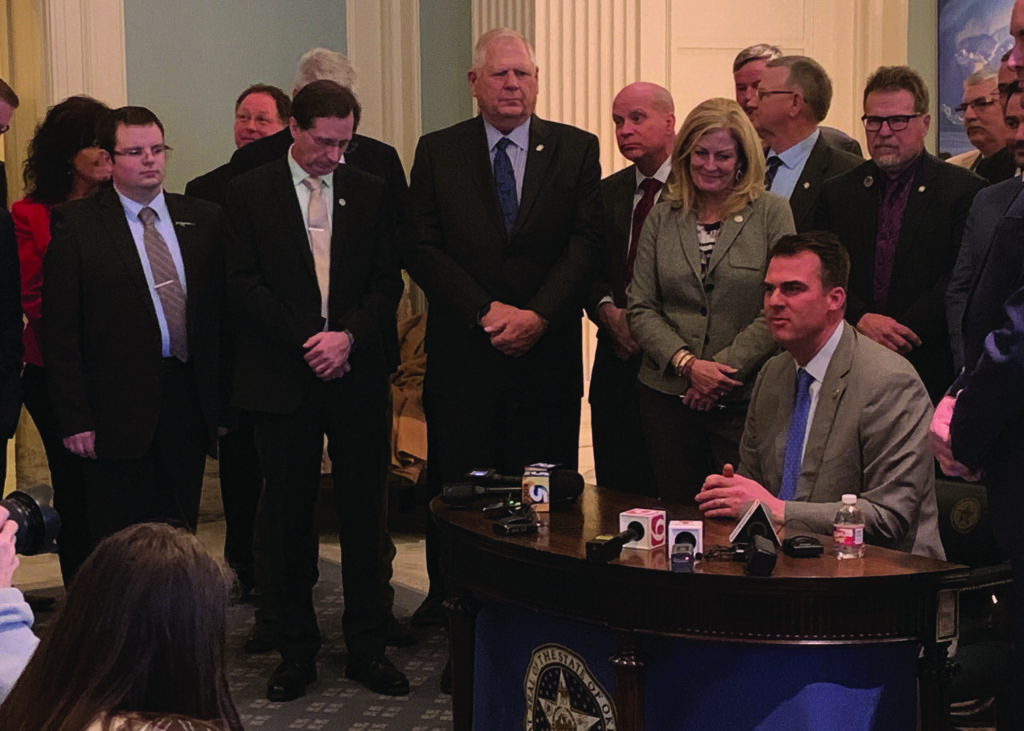
South Dakota
- South Dakota’s Constitutional Carry law allows anyone not otherwise prohibited from possessing a firearm aged 18 and up to carry, open or concealed, without a government permit.
- There is no residency requirement.
- In terms of reciprocity, South Dakota recognizes permits issued by all States.
- For reciprocity purposes, South Dakota issues Concealed Pistol Permits (CPP) to residents, as well as members of the military and their spouses stationed in South Dakota.
- It is not permitted to concealed carry a firearm:
- At any public elementary or secondary school
- In a school vehicle
- In any courthouse
- In any establishment that derives over half of its income from the sale of alcoholic beverages which are ingested on site.
- On January 31, 2019, Governor Kristi Noem signed Senate Bill 47 “constitutional carry”. The law took effect on July 1, 2019.

South Carolina
- South Carolina’s Constitutional Carry law allows anyone not otherwise prohibited from possessing a firearm to carry, open or concealed, without a government permit.
- Applies to ages 18+
- Created a 2 tier justice system to punish non-CWP holders convicted of gun crimes more heavily than those who held a CWP.
- No residency requirement
- H 3594 went into effect March 7th, 2024

Tennessee
- Tennessee’s Constitutional Carry law allows anyone not otherwise prohibited from possessing a firearm aged 18 and up to carry, open or concealed, without a government permit.
- Tennessee’s wording however presumes those who Constitutionally Carry as “guilty until proven innocent” by creating an exception to the state’s ban on “possession of a firearm with the intent to go armed”. In this case, those who Constitutionally Carry must prove that they are eligible for said exemption by meeting 7 criteria below
- That may lawfully possess a handgun;
- That is in a place where the person has a right to be;
- That has not been convicted of stalking;
- That has not been convicted of the offense of driving under the influence of an intoxicant in this or any other state 2 or more times within the prior 10 years or one time within the prior five years;
- That has not been adjudicated as a mental defective, judicially committed to, or hospitalized in, a mental institution, or had a court appoint a conservator for the person by reason of a mental defect; and
- Is not otherwise prohibited from possessing a firearm by 18 U.S.C. 922(g) as it existed on Jan. 1, 2021.
- While Tennessee is considered a Constitutional Carry state, the language of creating an “exception” to the law rather than a “rule” needs to be cleaned up to allow for minimal confusion between law-abiding gun owners and law enforcement.
- Creates confusion on locations where it is legal to carry. For example permit holders are legal to carry in public parks but those who carry without a permit are prohibited from carrying in public parks.
- Allows non-residents to practice Constitutional Carry
- SB 765 went into effect July 1st, 2021
Utah
- Utah’s Constitutional Carry law allows anyone not otherwise prohibited from possessing a firearm to carry, open or concealed, without a government permit.
- Does not apply to 18 to 20 year olds
- No residency requirement
- Some areas are off-limits, including courthouses and secured areas of airports
- SB 115 was signed by Governor Spencer Cox on March 24, 2022 and went into effect May 4th 2022.
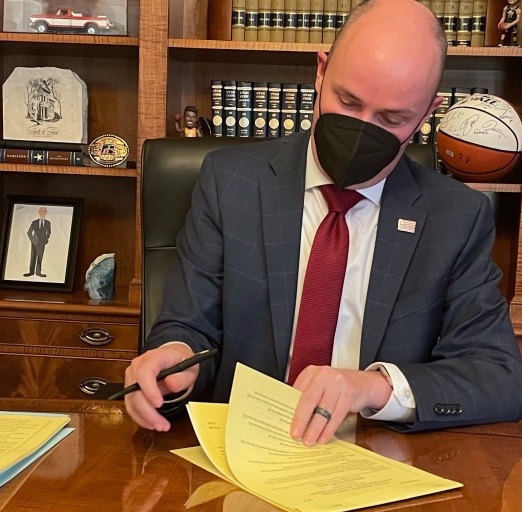
Texas
- Texas’ Constitutional Carry law allows anyone not otherwise prohibited from possessing a firearm to carry, open or concealed, without a government permit.
- No residency requirement
- Open carry handguns must be kept in a holster
- On Jan. 10, 2023, the Office of General Counsel sent a memo to DPS offices directing them to no longer enforce the state law that bars adults under 21 from carrying handguns in public. Therefore military-aged adults (18 to 20 years old) may carry)
- HB 1927 signed by Governor Abbott June 16th, 2021 and went into effect Sept. 1st, 2021
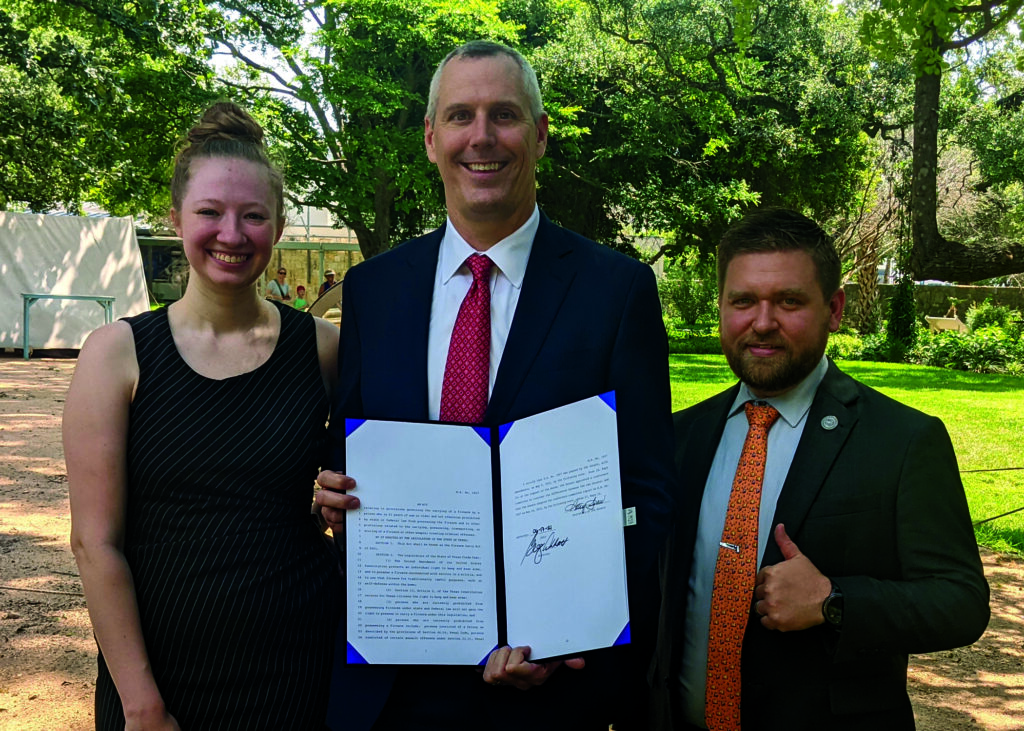
Vermont
- Has never had a permit requirement
- Any person 16 or older (although federal law requires the age to be 18 who call legally possess a firearm is allowed to carry open or concealed
- No residency requirement
- Constitutional Carry is enshrined in Vermont’s Constitution.
West Virginia
- Constitutional Carry law allows anyone not otherwise prohibited from possessing a firearm to carry openly, without a government permit.
- Only those 21 and older may carry concealed without a permit
- Military aged adults (18 to 20 years old) must have a permit to carry concealed but are allowed to carry openly.
- No residency requirement
- HB 4145 went into effect May 13, 2016 after legislature overrode Governor’s veto

Wyoming
- Constitutional Carry law allows anyone not otherwise prohibited from possessing a firearm to carry openly, without a government permit.
- Only those 21 and older may carry concealed without a permit
- Military aged adults (18 to 20 years old) must have a permit to carry concealed but are allowed to carry openly
- July 1st, 2021 Wyoming struck down residency requirement for Constitutional Carry
- On March 2nd, 2011 Governor Matt Mead signed Constitutional Carry into law, the 4th state to do so

